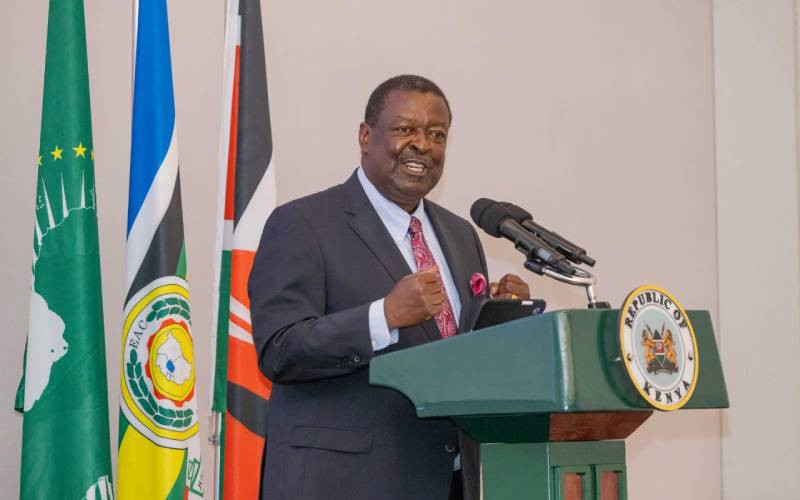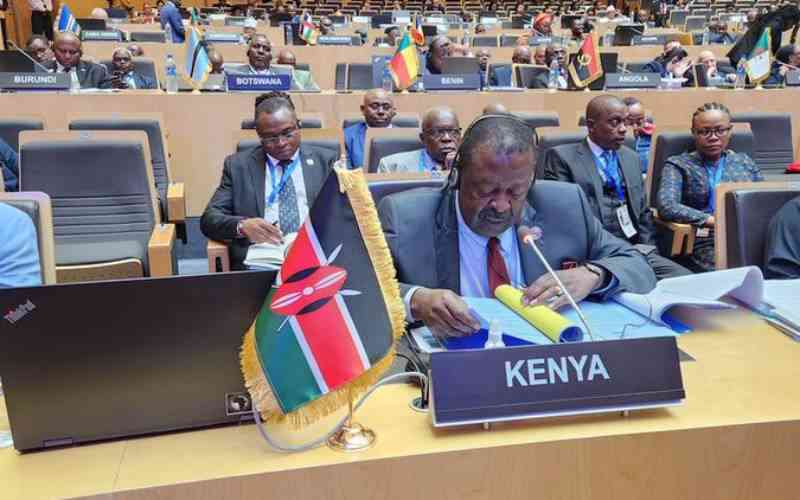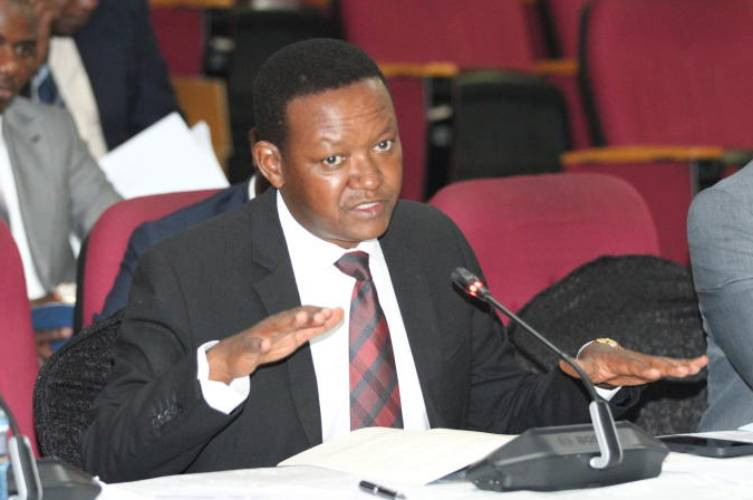By PLO Lumumba
At a time few spoke gainst European colonialism, Ghana’s Kwame Nkrumah told Africans, ‘Seek ye first the political kingdom and the rest will follow.’ At about the same time, another great Ghanaian Dr JE Kwegyir Aggrey said: ‘My people of Africa, we are created in the image of God, but men have made us think we are chickens, and we still think we are, but we are eagles’.
As Africa celebrates 50 years of the creation of the Organisation of the African Union (now the African Union), we must contend with several painful questions because many Africans lie in the grip of violence, poverty, disease and utter hopelessness. Somalia is struggling to regain its status as a state. Ethiopia is still emerging from the ‘Dergue’ regime’s atrocities. South Sudan, DRC Congo, Central African Republic, Libya and others are unstable. Africa is not at ease despite rosy statistics of economic growth.
To avoid pain, young Africans die in the Mediterranean Sea in pursuit of uncertainty and neo-slavery in Europe. Some are asked dehumanising questions at the embassies of Western countries in which they seek to live.
Africans were enslaved, colonised by European powers. After Nkurumah’s independence dream, they were neo-colonised and under the guise of trade, today, they are being recolonised by a resurgent China. But as usual, we appear not to see.
Africa remains the only continent referred to as Anglophone, Francophone, Lusophone, Arabophone to define its continued subservience to former colonising powers and other post-colonisation powers like USA, Russia and China. We must confront the question of whether we are authors of our own misfortune.
On November 17, 1867, at Miterwort Hall, Washington DC, Charles Brandon Boynton exhorted Blacks and said: “… Be not ashamed of your race... Dare to be a black man and accept the position God has assigned you. Do not believe it is an inferior one. It is honourable to be a black man as it is a white one. Aim to make yourself not a white man, but a perfect black man...”
Brandon saw the black man’s proclivity to assume he is inferior and as such, thus lending ‘credence’ to white supremacists belief that blacks are inferior.
The superiority complex is best captured in the words of former South African president PW Botha, who, in a secret speech delivered in 1985 to his cabinet, said inter alia “…let us join hands to fight against this black devil... Surely God cannot forsake his own people whom we are... every one of us has seen… that blacks cannot rule themselves. Give them guns and they will kill each other. They are good in nothing else but making noise, dancing, marrying many wives and indulging in sex. Let us all accept that the black man is the symbol of poverty, mental inferiority, laziness and emotional incompetence…”
These painful words by one of the architects of the Apartheid regime in South Africa are as sharp as they are bitter. But let the evidence be assessed. Have we collectively demonstrated that we are capable of running our affairs or we have lent credence to Afrophobes, who believe that Africans are hewers of wood and drawers of water?
Today, Latin America, Asia, most of the Arab world and most of Eastern Europe have acquitted themselves well in the manner in which they conduct their economic, social and political affairs. A few African countries also appear to be moving in the right direction, but the majority are in a sorry state.
While we claim to have embraced democracy, we need only read Ahmadou Kourouma’s Waiting for Wild Beasts to Vote to appreciate how we have bastardised democracy. A number of African countries hold elections but there are never losers, only thieves of the vote and those who have been rigged out. When we are called upon to vote, we are not animated by the political programmes of our (mis) leaders but the primordial instincts of ethnicity. Kenya’s Koigi wa Wamwere captures this well in his book ‘Towards Genocide in Kenya: The curse of Negative Ethnicity’; To each community negative ethnicity is glorified as saviour and destroyer of enemies.
But because it promises the destruction of all communities, negative ethnicity is the divider of all and a saviour of none. Once all communities are isolated from one another, the propagators of negative ethnicity are free to promise each salvation through the destruction of others. And because all communities will discover that others have been promised their destruction by this supposed saviour. No wonder negative ethnicity is the fastest growing ideology in Africa. In education, while over the years many Africans have built many universities, the African elite have no faith in their education systems. Depending on who colonised them; they will send their children to London, Paris, Lisbon, Brussels and the United States of America, never to Lagos or Nairobi.
In health, we have built hospitals but when we are sick, those who can afford seek treatment in the land of the erstwhile colonisers or lately in India, South Africa or Dubai. These include ministers in charge of medical services in their countries.
In sports, we still marvel at Europe and America. We celebrate foreign victories. In agriculture, we still produce less than we consume and have to depend on support from Europe and America. We have failed to subdue the earth, instead the earth has subdued us. In arts, our heroes are Tom Cruise, Angelina Jolie, Brad Pitt and not Olu Jacobs among others. Kenya’s Lupita Nyong’o only acquires value when the white movie industry has recognised her talent. If that talent had been recognised by Nollywood’s famous director Ugezu J Ugezu, she would not be celebrated. When we have our own awards, we are happy when they are called ‘African Oscars’; Originality is not our forte.
Stay informed. Subscribe to our newsletter
Africa is the richest resource continent with gold, uranium, cobalt, rare earth and other choice resources, but we cannot exploit it, instead it is Tullow, Elf, Shell, Total and others we call upon. We are perennial beggars who in the words of the former Prime Minister of the United Kingdom Tony Blair, are a ‘scar on the conscience of the world’.
In literature, Chimamanda Ngozi Adichie, the young Nigerian who writes with the panache of Chinua Achebe, Wole Soyinka and Flora Nwapa combined, visits Nairobi and leaves anonymously, but now that she has received the American ‘National Book Critics Award’ for her novel Americanah, we will begin to notice her, and the day the white man gives her the Nobel prize, she will suddenly be talented in the eyes of Africa.
But when Naomi Campbell visits African capitals with the white man’s seal of approval on her forehead like the mark of Cain, she will be a welcome visitor at African state houses.
In international economics, Zambia’s Dambisa Moyo of the ‘Dead Aid’ and ‘Winner Take It All’ fame is an African of repute, but few Africans know and acknowledge her. We will call her great when the white world says so, like we did with the likes of Wangari Maathai, Desmond Tutu and Nelson Mandela. The great Mwalimu Nyerere is not ‘so great’ because the white world never quite said so, yet he was the doyen of post-independence liberation struggles.
It used to be said that until the lions have their own historians, it is the exploits of the hunters that will forever be talked about and not the bravery of the lion. Today, we live in the information age, where the television, radio, internet and mobile telephony rule our lives. Europe and America tell their stories through international media channels such as CNN, BBC, Deutsche Welle, Radio France, CCTV of China, Aljazeera but Africans have none of their own.
African news is packaged by Associated Press, Reuters, AFP and Xinhua and images provided by Getty, Africa cannot even tell its stories, except infantile gibberish of the political class. In mobile telephony, we pride ourselves of the monumental growth through the revolutionary M-Pesa and other media. But who owns the network? It is Vodafone or MTN. Once again, Africa is the consumer. So what must Africans do? On May 24, 1963, in Addis Ababa, Kwame Nkurumah spoke passionately and eloquently, but few listened to him.
He said, On this continent, it has taken us long to discover that the struggle against colonialism does not end with the attainment of national independence. Independence is only the prelude to a new and more informed struggle for the right to conduct our own economic and social affairs; to construct our society according to our aspirations unhampered by crushing and humiliating neo-colonialist controls and interference. These words must now be the guiding principles of Africa’s declared Vision 2063. Speaking in Addis Ababa, Ethiopia on January 30, 2014, the President of African Union Commission, Dr Nkosazana Dlamini-Zuma echoed the words of Kwame Nkrumah.
In her imaginary letter to Kwame Nkrumah, she foresees a united Africa, whose economy has grown to be the third largest in the world; whose politics has stabilised, whose infrastructure has improved dramatically and whose people are happy and have self-belief having liberated themselves from the perpetual complaint mode.
While I embrace Nkosazana Dlamini-Zuma’s vision and enthusiasm, I am of the view that lofty declarations in and of themselves will not liberate Africa. Africans must have a monumental mental shift by gaining wisdom from this story told by Ghana’s Dr JE Kwegyir Aggrey when he talked about his ambition for the continent.
A certain man went through forest seeking any bird he might find. He caught a young bird, brought it home, put it among his fowls and ducks and turkeys, and gave it chicken’s food to eat.
Five years later, a naturalist came to visit the man, and notices the bird. He said to the owner, “Look here, this is an eagle, not a chicken”. “Yes, you may be right,” said the man, “but I have trained it to be chicken. It is no longer an eagle, it is a chicken, even though it is enormous. “No”, said the visitor, ‘it is still an eagle; it has the heart of an eagle, and I shall make it soar high to the heavens’. ‘No,’ said its owner, ‘it is now a chicken, and it will never fly’.
“They agreed to test it. The naturalist picked up the bird, held it up, and said loudly: “Eagle, thou art an eagle; thou dost belong to the sky and not down here. Stretch forth thy wings and fly”, and with that he hurled the bird up. The eagle turned this way and that way and then looking down, saw the chickens eating, and came to join them. “The owner said: “I told you it is now a chicken”. “No” said the man, ‘this bird is an eagle. I shall come back to prove this to you. The exercise was repeated three times, with the same result. The bird always came back to feed with the chickens.
“The naturalist came back again, chose a hill, and held the bird aloft, pointing it to the rising sun, and shouted: ‘Eagle, thou art an eagle; thou dost not belong down here. Thou dost belong to the sky; stretch forth thy wings and fly.’
The eagle e looked round, trembled as if new life was filling it, and suddenly stretched out its wings, and with the screech of an eagle, it mounted higher and higher, and never returned. It was really an eagle, though it had been kept and tamed like a chicken! My people of Africa, we were created in the image of God, but men have made us think that we are chickens, and we still think we are, but we are eagles. Stretch forth your wings and fly! Don’t be content with the food of chickens.
The moral of Dr JE Aggrey’s story is that Africans have the ‘potential’. But potential and reality can be worlds apart. It, therefore, behooves Africans at all levels to exorcise the ghost of low self-esteem and embrace self-respect. It is inexcusable that a continent of nearly a billion people with mind and intellect should still be a basket case of the world dependent on and from Europe and America and lately China. Africa must rise from her deeper slumber, otherwise she will continue to be a scar on the conscience of humanity, merely tolerated by other civilisations but never respected. It can be done; it must be done because if it is not done, another coloniser and enslaver will take us back to Egypt.
The future, as things stand today will be determined by creativity, innovation and self-belief.
 The Standard Group Plc is a
multi-media organization with investments in media platforms spanning newspaper
print operations, television, radio broadcasting, digital and online services. The
Standard Group is recognized as a leading multi-media house in Kenya with a key
influence in matters of national and international interest.
The Standard Group Plc is a
multi-media organization with investments in media platforms spanning newspaper
print operations, television, radio broadcasting, digital and online services. The
Standard Group is recognized as a leading multi-media house in Kenya with a key
influence in matters of national and international interest.
 The Standard Group Plc is a
multi-media organization with investments in media platforms spanning newspaper
print operations, television, radio broadcasting, digital and online services. The
Standard Group is recognized as a leading multi-media house in Kenya with a key
influence in matters of national and international interest.
The Standard Group Plc is a
multi-media organization with investments in media platforms spanning newspaper
print operations, television, radio broadcasting, digital and online services. The
Standard Group is recognized as a leading multi-media house in Kenya with a key
influence in matters of national and international interest.









